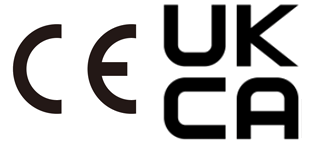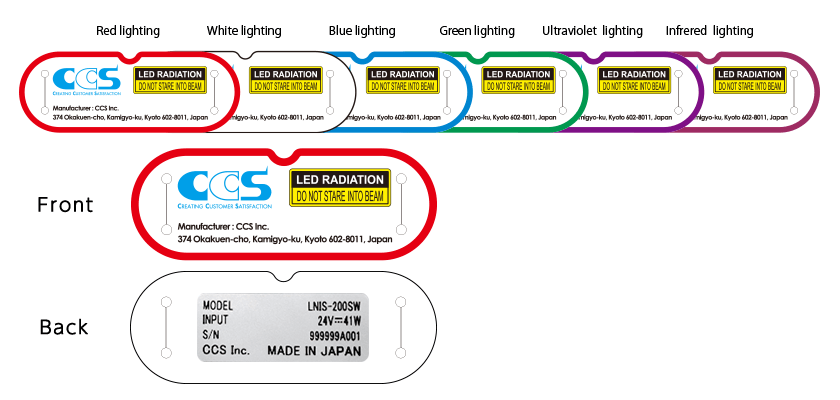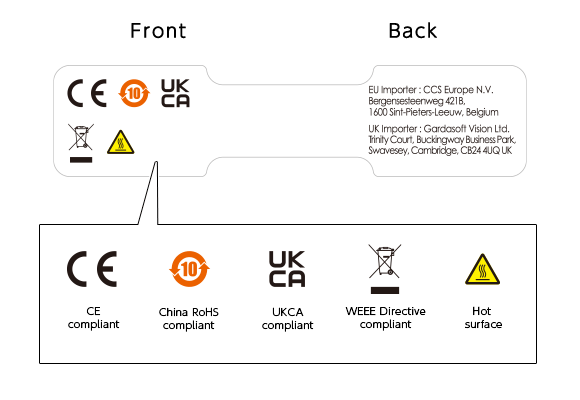Regulations
Photobiological Safety Evaluation of LED Lights for Image Processing
In 2006, the International Electrotechnical Commission published the IEC 62471 "Standard Regarding Photobiological Safety of Lamps and Lamp Systems," and LED lighting is included in the scope of application for this standard.
IEC 62471 acts as a guideline for conducting evaluations of photobiological safety, and it is an international standard that is used during evaluations to assess the risk of damage to the skin and eyes caused by light.
Photobiological risk can be divided into 4 different risk groups (degrees of hazard) based on the degree of photobiological damage caused.
Our company has implemented risk group classification for image processing LED lighting for the following evaluation items. (Applicable standard: IEC 62471 Edition 1.0 (2006))
"Evaluation Items"
<Photobiological Risk>
- 1) Eye damage caused by near ultraviolet radiation
- 2) Retinal damage caused by blue light
- 3) Retinal damage caused by blue light from miniature light sources
- 4) Retinal heat injuries
- 5) Retinal heat injuries caused by low visibility light
- 6) Eye damage caused by infra-red radiation
- 7) Heat injuries to the skin
<Risk Classification>
- 1) Exempt(exempt from hazard classification): Does not cause any form of photobiological damage
- 2) Low risk(low degree of hazard): Does not cause damage that would limit the victim's normal functioning
- 3) Mod risk(moderate degree of hazard): Does not cause damage that would lead to the victim feeling nauseous or feeling any heat related discomfort
- 4) High risk(high degree of hazard): Damage is caused by temporary or short duration exposure to light
In order to ensure the safe usage of LED Lights, CCS has categorized the risks related to each Light Unit.
If you are considering the purchase of LED Lights or are checking hazard related information for a product you have purchased, please refer to the specifications section on the various product information pages contained within the "Product Search/Material Download" section of this website.
Safety of Laser Products from CCS, Inc.
The safety of laser products is specified in IEC 60825-1. In Japan, JIS C 6802 corresponds to IEC 60825-1.
For classifications of laser products outside of Japan, please see below.
(Cited from: IEC 60825-1:2014 Annex C C.2, and Annex F Table F.2)
| Class | Class Description | Description of Hazard Class |
|---|---|---|
| Class 1 | Laser products that are safe during use, including long-term direct intrabeam viewing, even when exposure occurs while using telescopic optics. | Safe under reasonably foreseeable conditions. |
| Class 1M | Laser products that are safe, including long-term direct intrabeam viewing for the naked eye (unaided eye). | As for Class 1 except may be hazardous if user employs optics. |
| Class 2 | Laser products that emit visible radiation in the wavelength range from 400 nm to 700 nm that are safe for momentary exposures but can be hazardous for deliberate staring into the beam. | Low power; eye protection normally afforded by aversion & active responses. |
| Class 2M | Laser products that emit visible laser beams and are safe for short time exposure only for the naked (unaided) eye. | As for Class 2 except may be more hazardous if user employs optics. |
| Class 3R | Laser products that emit radiation that can exceed the MPE*1 under direct intrabeam viewing, but the risk of injury in most cases is relatively low. The AEL*2 for Class 3R is limited to 5 times the AEL of Class 2 (visible laser radiation) or 5 times the AEL of Class 1 (for non-visible laser radiation). |
Direct intrabeam viewing may be hazardous. |
| Class 3B | Laser products that are normally hazardous when intrabeam ocular exposure occurs (i.e. within the NOHD*3) including accidental short time exposure. | Direct intrabeam viewing normally hazardous. |
| Class 4 | Laser products for which intrabeam viewing and skin exposure is hazardous and for which the viewing of diffuse reflections may be hazardous. These lasers also often represent a fire hazard. | High power; diffuse reflections may be hazardous. |
- * Class 1C is for medical and cosmetic applications. They are different applications from our products so it is not written in the above explanation.
- *1 MPE: Maximum Permissible Exposure
- *2 AEL: Accessible Emission Limit
- *3 NOHD: Nominal Ocular Hazard Distance
List of Products Conforming to EU Standard and UKCA Mark
In accordance with the enactment of the EU Machinery Directive/EMC Directive/Low Voltage Directive/RoHS Directive/WEEE Directive, and other laws in EU countries, the CE Mark is required to distribute machinery/electrical devices within the EU.
In addition, with the UK's withdrawal from the EU, the UKCA Mark is required in place of the CE Mark in the UK.
CCS affirms that its lighting products and lighting control unit products comply with the relevant EN standards, and we are available to assist customers in maintaining compliance with EU Directives/UKCA Directives for machinery/electrical devices.

List of Products Conforming to EU Standard and UKCA Mark
Light Units
| Series name | CE | UKCA | ||||
|---|---|---|---|---|---|---|
| Safety standard | EMC | Safety standard | EMC | |||
| EMS | EMI | EMS | EMI | |||
LDR2, LDR2-LA, LDR-LA-1, SQR,
SQR-TP, HLDR3, HLDR-IP, HPR2,
LFR, LKR, FPR, FPQ3, LDL2,
HLDL3, LB, TH2, TH2-PM,
TH2-CR, LFL, HPD2, LDM2, LAV,
PDM, LFXV, LFX3, LFX3-PT, LFV3,
LFV3-G, MSU, MFU, PF, UV3/VL3,
UV, IR2, IR (Over 1000-nm Type),
CIR, HLV3-14, HLV3-22,
HLV3-22-4-NR, HLV3-3MRGB-4,
HSL-PCL, LV, LS, LNSP2, LN,
LN-HK, LNSD, LND2, LT, LNV,
LNIS2, LNIS |
EN 62471 | - | - | BS EN 62471 | - | - |
| LNLP, LDLB, LNSP-FN, LNSP-UV-FN, LNIS-FN, LNDG, OLF-LT, OLB-LT |
EN 62471 | EN 61000-6-2 | EN 61000-6-4 | BS EN 62471 | BS EN 61000-6-2 | BS EN 61000-6-4 |
| LDF-NB | EN 62471 EN 60825-1 |
- | - | BS EN 62471 BS EN 60825-1 |
- | - |
Integrated Control Units for Light Units
| Series name | CE | UKCA | ||||
|---|---|---|---|---|---|---|
| Safety standard | EMC | Safety standard | EMC | |||
| EMS | EMI | EMS | EMI | |||
| PFBR-600SW2-LL, PFBR-600SW2-LLCF |
EN 62471 EN 60825-1 EN 61010-1 EN 62311 |
EN 61000-6-2 | EN 61000-3-2 EN 61000-3-3 EN 61000-6-4 |
BS EN 62471 BS EN 60825-1 BS EN 61010-1 BS EN 62311 |
BS EN 61000-6-2 | BS EN 61000-3-2 BS EN 61000-3-3 BS EN 61000-6-4 |
| PFBR-150SW-MN | EN 62471 EN 61010-1 EN 62311 |
EN 61000-6-2 | EN 61000-3-2 EN 61000-3-3 EN 61000-6-4 |
BS EN 62471 BS EN 61010-1 BS EN 62311 |
BS EN 61000-6-2 | BS EN 61000-3-2 BS EN 61000-3-3 BS EN 61000-6-4 |
| PFB3-20SW-AJT(A), PFB3-20SW-PJT(A), PFB3-20SW-SJT(A), PFB3-20SW-JT(A) |
EN 62471 | EN 61000-6-2 | EN 61000-6-4 | BS EN 62471 | BS EN 61000-6-2 | BS EN 61000-6-4 |
Control Units
| Series name | CE | UKCA | ||||
|---|---|---|---|---|---|---|
| Safety standard | EMC | Safety standard | EMC | |||
| EMS | EMI | EMS | EMI | |||
PD4, PD3 (AC input types),
PD2, POD, PTU2,
PF, PJ2, PJ (AC input types),
PSCC-60048(A),
PSCC-30028(A),
PSB4, PSB3 |
EN 61010-1 EN 62311 |
EN 61000-6-2 | EN 61000-6-4 | BS EN 61010-1 BS EN 62311 |
BS EN 61000-6-2 | BS EN 61000-6-4 |
PD3 (DC input types/Parallel),
PJ (DC input types),
CC-PJ-0707,
CN-EPOE,
CN-4024-2-EIPT,
OC-0736-1-ET |
- | EN 61000-6-2 | EN 61000-6-4 | - | BS EN 61000-6-2 | BS EN 61000-6-4 |
PD3 (DC input types/Keepalive),
CC-ST |
- | EN 61326-1 | - | BS EN 61326-1 |
||
Note: Our Light Units that were designed and developed in September 2011 or later comply with the EU standard and bear the CE marking. For information on the cabling products, refer to the product web pages.
Note: The warranty period of the custom order product is different from that listed above. Contact your local sales office for details.
Examples of Label Tags and Regulations Tag
Lights of CCS have label tags and Regulations tag as shown below attached to their cables or case bodies.
Label Tags
These labels are color-coded according to each emitted light color of the units.The model, serial number, and related information are shown on the back of the label.
Regulations Tag
Regulation information such as CE and UKCA marking are shown on this tag.

